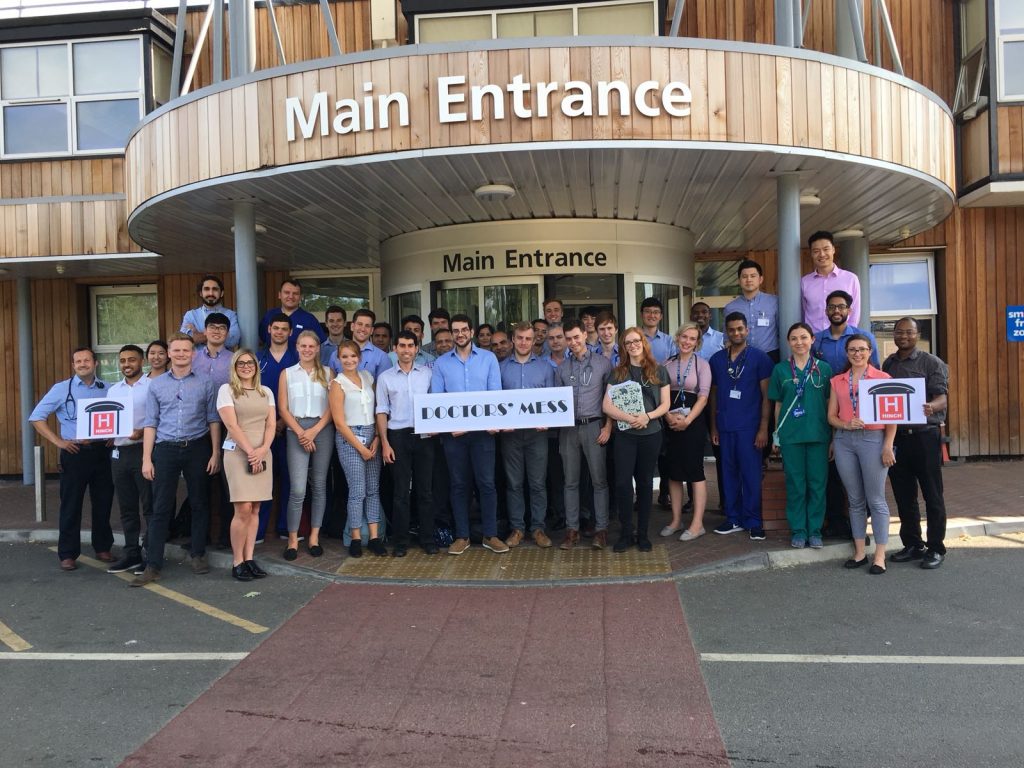Medicine is a popular subject with ECP students. This term, five girls from the Class of 2018 started the journey to becoming a doctor at Charles University.
Our students also study Medicine in the UK and when Michal Barabas offered to come in to speak to current students thinking about a career in medicine, we were delighted to welcome him back. He spoke about his own journey since leaving the ECP. He showed students that there is more than one route to becoming a doctor.
Doctor Barabas first studied Pharmacology at University College London. His plan was to become an academic scientist. But after graduating from UCL, he realised that he didn’t want to spend his working life in front of a bench, pipette in hand. Michal’s horizons were wider; he wanted to study diseases more broadly and their effect on people. He also realised that he wanted more human interaction than is usually available to scientists.
Cambridge University
So he took a rather less well-known route to becoming a doctor. He returned to university, to Cambridge, to study for a post-graduate degree in Medicine. This route is open not only to science graduates, but also to those whose first degree is in a very different discipline. Michal trained with someone who had studied French and Spanish for their first degree. It is a more intensive four-year course, but not so intensive that he didn’t find time to indulge his passion for ice hockey. He played for Cambridge, taking part in the traditional Varsity match against Oxford University.
Training as a Hospital Doctor
Now a qualified doctor, Michal has now just taken up his first appointment as a Foundation Doctor. He is working at Hinchingbrooke Hospital in Huntingdon, just outside Cambridge.
Current students heard Michal talk about how his next few years as a doctor in training will be. He will be rotating around the various specialties in a busy general hospital. This is so he can get experience of all the options open to him. At the moment, he is working in the medical short stay unit. This is suitable for patients who are expected to stay in hosptal for a shorter period of time. They may have contracted pneumonia, sepsis or need further investigations into their symptoms.
Medicine has something for everyone
Medicine has many faces so every single personality is catered for ranging from pathology, radiology through internal medicine to specialties dealing with complex surgery such as neurosurgery or maxillofacial surgery. In the UK, these include specialties less common in the Czech Republic such as palliative care, which deals with the management of symptoms patients experience as they approach the end of their lives.
A Day in the Life of a Foundation Doctor
Michal described a typical day on the unit. It begins with the ward round, led by a senior doctor. They will see each patient on the ward and decide on their treatment plans for the day. It is then the job of junior doctors like Michal to ensure that the plans are carried out. This might involve arranging new drug regimes, performing special blood tests or procedures such as a lumbar puncture or arranging more complex imagining such as magnetic resonance, CT or ultrasound.
His working week is a manageable 40 hours although like all other doctors, he says that NHS staff tare stretched to cope with the growing demand. He regularly has to work an extra hour or two to complete his patients’ plans. And not all those hours are 9-5 as patients are ill 24 hours a day. When Michal works overnight, he is responsible for five wards, each caring for around 50 patients. It is to Michal that the on-duty nurses will bring their concerns about their patients.
Michal answered students’ questions. He generously said that he would be happy for them to email him as they continue to contemplate a career in medicine.
Memories of the English College
One interesting question was ‘why did you chose to study Pharmacology at university?’ Michal said: “I enjoyed my Chemistry lessons with Mr Emmerson and my Biology lessons with Ms Kerr so I knew I wanted to study a scientific subject. Mr Emmerson and Ms Kerr were obviously very pleased to hear that Michal is now a doctor, helping to heal sick people.
And what did Michal have to say about his first visit back to his old school? “It was great to be back after so long and to get to meet my former teachers. A lot was the same as I remembered it – the friendly, family atmosphere, the thoughtful students and the committed teachers.”
Impressive Laboratories
“But a lot has changed as well – the revamped refectory and especially the new laboratories. They are very impressive and almost approach the standard of those I got to experience in the pharmaceutical industry. Current ECP students are very privileged to be able to use them and I am certain that they will help to inspire many students to pursue science or medicine at university, just like they did in my case.”
